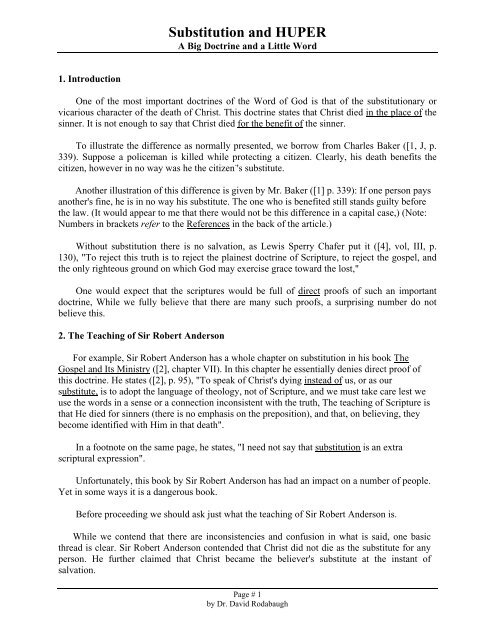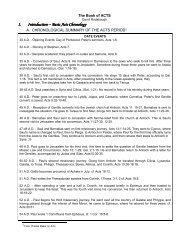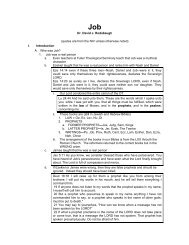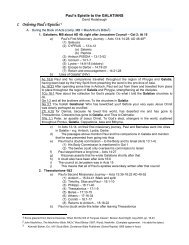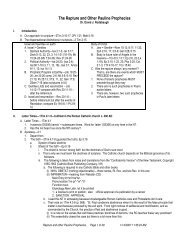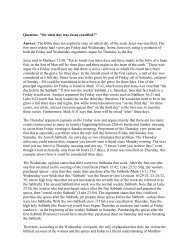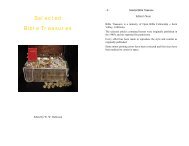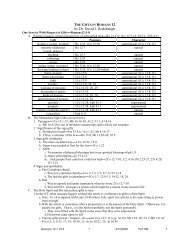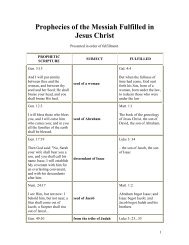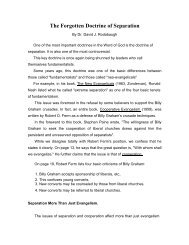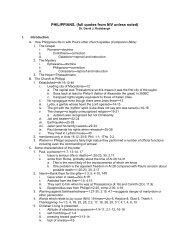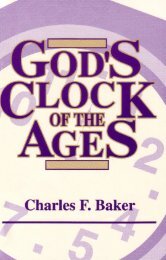Substitution and HUPER - Hope of the Glory
Substitution and HUPER - Hope of the Glory
Substitution and HUPER - Hope of the Glory
Create successful ePaper yourself
Turn your PDF publications into a flip-book with our unique Google optimized e-Paper software.
<strong>Substitution</strong> <strong>and</strong> <strong>HUPER</strong><br />
A Big Doctrine <strong>and</strong> a Little Word<br />
1. Introduction<br />
One <strong>of</strong> <strong>the</strong> most important doctrines <strong>of</strong> <strong>the</strong> Word <strong>of</strong> God is that <strong>of</strong> <strong>the</strong> substitutionary or<br />
vicarious character <strong>of</strong> <strong>the</strong> death <strong>of</strong> Christ. This doctrine states that Christ died in <strong>the</strong> place <strong>of</strong> <strong>the</strong><br />
sinner. It is not enough to say that Christ died for <strong>the</strong> benefit <strong>of</strong> <strong>the</strong> sinner.<br />
To illustrate <strong>the</strong> difference as normally presented, we borrow from Charles Baker ([1, J, p.<br />
339). Suppose a policeman is killed while protecting a citizen. Clearly, his death benefits <strong>the</strong><br />
citizen, however in no way was he <strong>the</strong> citizen - 's substitute.<br />
Ano<strong>the</strong>r illustration <strong>of</strong> this difference is given by Mr. Baker ([1] p. 339): If one person pays<br />
ano<strong>the</strong>r's fine, he is in no way his substitute. The one who is benefited still st<strong>and</strong>s guilty before<br />
<strong>the</strong> law. (It would appear to me that <strong>the</strong>re would not be this difference in a capital case,) (Note:<br />
Numbers in brackets refer to <strong>the</strong> References in <strong>the</strong> back <strong>of</strong> <strong>the</strong> article.)<br />
Without substitution <strong>the</strong>re is no salvation, as Lewis Sperry Chafer put it ([4], vol, III, p.<br />
130), "To reject this truth is to reject <strong>the</strong> plainest doctrine <strong>of</strong> Scripture, to reject <strong>the</strong> gospel, <strong>and</strong><br />
<strong>the</strong> only righteous ground on which God may exercise grace toward <strong>the</strong> lost,"<br />
One would expect that <strong>the</strong> scriptures would be full <strong>of</strong> direct pro<strong>of</strong>s <strong>of</strong> such an important<br />
doctrine, While we fully believe that <strong>the</strong>re are many such pro<strong>of</strong>s, a surprising number do not<br />
believe this.<br />
2. The Teaching <strong>of</strong> Sir Robert Anderson<br />
For example, Sir Robert Anderson has a whole chapter on substitution in his book The<br />
Gospel <strong>and</strong> Its Ministry ([2], chapter VII). In this chapter he essentially denies direct pro<strong>of</strong> <strong>of</strong><br />
this doctrine. He states ([2], p. 95), "To speak <strong>of</strong> Christ's dying instead <strong>of</strong> us, or as our<br />
substitute, is to adopt <strong>the</strong> language <strong>of</strong> <strong>the</strong>ology, not <strong>of</strong> Scripture, <strong>and</strong> we must take care lest we<br />
use <strong>the</strong> words in a sense or a connection inconsistent with <strong>the</strong> truth, The teaching <strong>of</strong> Scripture is<br />
that He died for sinners (<strong>the</strong>re is no emphasis on <strong>the</strong> preposition), <strong>and</strong> that, on believing, <strong>the</strong>y<br />
become identified with Him in that death".<br />
In a footnote on <strong>the</strong> same page, he states, "I need not say that substitution is an extra<br />
scriptural expression".<br />
Unfortunately, this book by Sir Robert Anderson has had an impact on a number <strong>of</strong> people.<br />
Yet in some ways it is a dangerous book.<br />
Before proceeding we should ask just what <strong>the</strong> teaching <strong>of</strong> Sir Robert Anderson is.<br />
While we contend that <strong>the</strong>re are inconsistencies <strong>and</strong> confusion in what is said, one basic<br />
thread is clear. Sir Robert Anderson contended that Christ did not die as <strong>the</strong> substitute for any<br />
person. He fur<strong>the</strong>r claimed that Christ became <strong>the</strong> believer's substitute at <strong>the</strong> instant <strong>of</strong><br />
salvation.<br />
Page # 1<br />
by Dr. David Rodabaugh
<strong>Substitution</strong> <strong>and</strong> <strong>HUPER</strong><br />
A Big Doctrine <strong>and</strong> a Little Word<br />
On such a central issue as this, we might wonder what arguments he used. Sir Robert<br />
Anderson claims to <strong>of</strong>fer, first a positive statement <strong>of</strong> <strong>the</strong> truth upon this subject, as it is<br />
unfolded in <strong>the</strong> types <strong>of</strong> <strong>the</strong> Old Testament <strong>and</strong> in <strong>the</strong> doctrinal teaching <strong>of</strong> <strong>the</strong> New," ([2], p.<br />
88),<br />
He <strong>the</strong>n proceeds to base his argument on his underst<strong>and</strong>ing <strong>of</strong> types <strong>and</strong> his underst<strong>and</strong>ing<br />
<strong>of</strong> <strong>the</strong> Greek word huper, He does not give direct support from <strong>the</strong> New Testament although <strong>the</strong><br />
above might lead us to expect that. Instead he tries to argue from his position in favor <strong>of</strong> what we<br />
call Unlimited Redemption.<br />
a. Types <strong>and</strong> Sir Robert Anderson<br />
The subject <strong>of</strong> types is very interesting <strong>and</strong> important. It is full <strong>of</strong> many illustrations <strong>of</strong> <strong>the</strong><br />
truth <strong>of</strong> God, but, a type must never be <strong>the</strong> primary basis for a doctrine. We must first learn <strong>the</strong><br />
doctrine precisely <strong>and</strong> <strong>the</strong>n <strong>the</strong> type becomes an illustration, Too <strong>of</strong>ten, a type is interpreted a<br />
certain way <strong>and</strong> this is <strong>the</strong>n <strong>the</strong> basis for some (possibly strange) doctrinal position.<br />
Such reasoning is wrong. We must search <strong>the</strong> scriptures for <strong>the</strong>ir teaching on a subject. Only<br />
after such a foundation are we in a position to study <strong>the</strong> types related to that doctrine. Sir Robert<br />
Anderson's argument from types is clearly presented ([2], p. 91) where he states:<br />
"And <strong>the</strong> way to follow aright <strong>the</strong> teaching <strong>of</strong> <strong>the</strong> types is to regard <strong>the</strong>ir historical<br />
sequence as marking <strong>the</strong>ir moral order. We thus learn <strong>the</strong> different aspects <strong>of</strong> <strong>the</strong> death<br />
<strong>of</strong> Christ, <strong>and</strong> <strong>the</strong> divine order <strong>of</strong> <strong>the</strong> truth concerning it . According to <strong>the</strong> analogy <strong>of</strong><br />
<strong>the</strong> great day <strong>of</strong> atonement, <strong>the</strong> tw<strong>of</strong>old aspect <strong>of</strong> <strong>the</strong> great day <strong>of</strong> atonement, <strong>the</strong><br />
tw<strong>of</strong>old aspect <strong>of</strong> <strong>the</strong> same <strong>of</strong>fering is presented by two victims, <strong>the</strong> one being killed,<br />
<strong>the</strong> o<strong>the</strong>r sent out <strong>of</strong> sight."<br />
This is clearly argument from type. The fact that he presents it first is dangerous in any<br />
teaching. The fact that he states, as we quoted above, that, "substitution is an extra scriptural<br />
expression," shows that this is his only argument. And, that is scary.<br />
While it is not our purpose to pursue <strong>the</strong> matter here, suffice it to say that we do not accept<br />
Sir Robert Anderson`s explanation <strong>of</strong> types.<br />
In summary we state that proper doctrine is <strong>the</strong> basis <strong>of</strong> <strong>the</strong> study <strong>of</strong> types; <strong>the</strong> study <strong>of</strong> types<br />
is not <strong>the</strong> basis <strong>of</strong> proper doctrine.<br />
b. <strong>the</strong> word huper <strong>and</strong> Sir Robert Anderson<br />
Certainly, any reader familiar with God's Word would wonder what Sir Robert Andersen<br />
does with such basic passages <strong>of</strong> scripture as Romans 5:6-8.<br />
He states ([2], p, 95 footnote) that <strong>the</strong> Greek word for instead <strong>of</strong> is anti, He claims that:<br />
Page # 2<br />
by Dr. David Rodabaugh
<strong>Substitution</strong> <strong>and</strong> <strong>HUPER</strong><br />
A Big Doctrine <strong>and</strong> a Little Word<br />
"<strong>the</strong> word huper no doubt may have <strong>the</strong> same force as 'for' in English. But in ei<strong>the</strong>r<br />
case such a meaning is exceptional <strong>and</strong> forced; <strong>and</strong> in our own language we should<br />
in that case pronounce <strong>the</strong> word with emphasis, <strong>and</strong> print it in italics. A full <strong>and</strong><br />
careful consideration <strong>of</strong> every passage where <strong>the</strong> word occurs will satisfy <strong>the</strong> student<br />
it is never so used in <strong>the</strong> New Testament, , , , I need not say that substitution is an<br />
extra scriptural expression."<br />
This author is one student who has carefully studied every such passage <strong>and</strong> is convinced that<br />
<strong>the</strong> above quote represents serious error from <strong>the</strong> pen <strong>of</strong> Sir Robert Anderson. So serious is it that<br />
this author could not in any way recommend it.<br />
We will first look briefly at several important errors in his treatment <strong>and</strong> <strong>the</strong>n we will turn to<br />
<strong>the</strong> issue regarding huper <strong>and</strong> its meaning.<br />
c. Problems in His Treatment<br />
Before proceeding with pro<strong>of</strong> that Sir Robert Anderson is wrong, it instructive to note some<br />
internal inconsistencies <strong>and</strong> immediate problems in his argument.<br />
Truth has at least two important properties. One is internal consistency <strong>and</strong> <strong>the</strong> o<strong>the</strong>r is<br />
conformity to known truth.<br />
We divide this part <strong>of</strong> <strong>the</strong> inquiry into <strong>the</strong> following!<br />
1. His (Sir Robert Anderson's) treatment <strong>of</strong> <strong>the</strong> sin-<strong>of</strong>fering,<br />
2. His concern over effectual redemption<br />
3. Anti<br />
4. Doctrine <strong>and</strong> Precision<br />
(1) <strong>the</strong> Sin Offering<br />
Sir Robert Anderson clearly states ([2], pp. 89-90}) that <strong>the</strong> victim in <strong>the</strong> sin-<strong>of</strong>fering gave<br />
his life instead <strong>of</strong> <strong>the</strong> <strong>of</strong>ferer. And, he asserts, this is clearly substitution.<br />
To this we quite agree. However; this would seem to totally destroy his underst<strong>and</strong>ing <strong>of</strong><br />
huper. The sin-<strong>of</strong>fering pictured Christ as laden with <strong>the</strong> sins oil an individual (see Lev. 4).<br />
There is no question that Mt. 26:28 refers to <strong>the</strong> sin-<strong>of</strong>fering yet anti is not used. The<br />
contention ([1,2]) that without anti, substitution is not in view really suffers for peri is used in<br />
this verse.<br />
In Gal, 1:4 we have <strong>the</strong> work <strong>of</strong> Christ for <strong>the</strong> sins <strong>of</strong> believers. There is no thought in this<br />
passage <strong>of</strong> anything but substitution. The word huper is used in Gal. 1:14. Similar references are<br />
in Eph. 5:2, 25-27 where <strong>the</strong> contexts forbid a non-substitutionary interpretation. The reader<br />
might study all places where huper occurs. O<strong>the</strong>r unmistakable references to <strong>the</strong> sin-<strong>of</strong>fering<br />
where huper is used include Titus 2:14 <strong>and</strong> I Pet. 2:21-24 (huper is in verse 21).<br />
Page # 3<br />
by Dr. David Rodabaugh
<strong>Substitution</strong> <strong>and</strong> <strong>HUPER</strong><br />
A Big Doctrine <strong>and</strong> a Little Word<br />
It is interesting that Sir Robert Anderson sees substitution in 1 Pet. 2:24 ([2] p.92) but fails to<br />
read verse 21. This inconsistency alone shows his argument can't st<strong>and</strong>.<br />
(2) Effectual Redemption<br />
It would appear that <strong>the</strong> more blessed a truth <strong>the</strong> more it is hated <strong>and</strong> maligned.<br />
Sir Robert Anderson states {[2], pp. 97-98):<br />
"But to speak <strong>of</strong> <strong>the</strong> death <strong>of</strong> Christ as having this substitutional relationship to <strong>the</strong><br />
sinner, apart from <strong>the</strong> change which takes place on his believing, <strong>and</strong> thus to make his<br />
pardon appear to be an act <strong>of</strong> justice in such a sense that it ceases to be an act <strong>of</strong> grace, is<br />
wholly unwarranted <strong>and</strong> false. If <strong>the</strong>re be those on earth whose case is beyond <strong>the</strong> scope<br />
<strong>of</strong> <strong>the</strong> work <strong>of</strong> Christ, it is not in <strong>the</strong> power <strong>of</strong> God to save <strong>the</strong>m; <strong>and</strong> thus redemption<br />
has failed <strong>of</strong> its first <strong>and</strong> highest aim, which is not <strong>the</strong> saving <strong>of</strong> <strong>the</strong> sinner, merely, but<br />
<strong>the</strong> restoring to God His sovereignty compromised by sin. But if <strong>the</strong> death <strong>of</strong> Christ be<br />
substitutionally instead <strong>of</strong> <strong>the</strong> unbeliever, his conversion may alter his condition<br />
spiritually <strong>and</strong> morally, but it can in no wise affect his judicial state: he is saved in fact<br />
<strong>and</strong> <strong>of</strong> right, whe<strong>the</strong>r he believes or not, In ei<strong>the</strong>r case, qrace is in chains, <strong>and</strong> not<br />
enthroned." (Emphasis his).<br />
So <strong>the</strong>re you have it. He hates <strong>the</strong> doctrines commonly nicknamed "Calvinism". He doesn't<br />
underst<strong>and</strong> <strong>the</strong>m but he hates <strong>the</strong>m.<br />
Notice first that he has totally changed <strong>the</strong> meanings <strong>of</strong> some important words. When we<br />
speak <strong>of</strong> a sovereign God in connection with salvation we mean (<strong>and</strong> all in history have meant)<br />
that God saves whom He wishes. He is in charge. He not only makes <strong>the</strong> rules--He makes <strong>the</strong><br />
choices. Sir Robert Anderson has twisted this to mean that you make <strong>the</strong> choice.<br />
When we (<strong>and</strong> o<strong>the</strong>rs) speak <strong>of</strong> grace enthroned we refer again to God doing it all because<br />
we couldn't do anything. (Even faith is a gift from God.) However, when he speaks <strong>of</strong> grace<br />
enthroned, he means that our choice is enthroned. This is not grace at all.<br />
Such twisting <strong>of</strong> <strong>the</strong> clear meanings <strong>of</strong> words is always indicative <strong>of</strong> deception. It is a<br />
trick used <strong>the</strong>ology by liberals <strong>and</strong> o<strong>the</strong>r opponents <strong>of</strong> truth. After all, every person in church<br />
knows that <strong>the</strong> reformers enthroned grace in <strong>the</strong>ir doctrine <strong>of</strong> <strong>the</strong> sovereignty <strong>of</strong> God. To<br />
deny <strong>the</strong>se truths is to be aligned with Roman Catholic <strong>the</strong>ology. The trick, if you don't<br />
believe <strong>the</strong>se truths, is to redefine <strong>the</strong>m. It is a mean <strong>and</strong> disgusting trick <strong>and</strong> must be<br />
rejected by all.<br />
The teaching <strong>of</strong> grace enthroned is that <strong>the</strong> sovereign triune God did <strong>the</strong> following by His<br />
grace alone!<br />
1. The Fa<strong>the</strong>r chose certain people.<br />
2. The Son died in <strong>the</strong>ir place.<br />
3. The Holy Spirit regenerates <strong>the</strong>m, giving <strong>the</strong>m faith to believe.<br />
Page # 4<br />
by Dr. David Rodabaugh
<strong>Substitution</strong> <strong>and</strong> <strong>HUPER</strong><br />
A Big Doctrine <strong>and</strong> a Little Word<br />
Thus God - 's work is a work <strong>of</strong> grace which is made, by <strong>the</strong> work <strong>of</strong> Christ, consistent with<br />
His justice. It is wonderful <strong>and</strong> we rejoice in it (Titus 2:11-14). It is a truth concerning which we<br />
(Titus 2:15), "speak, <strong>and</strong> exhort, <strong>and</strong> rebuke with all authority".<br />
(3) Anti<br />
In admitting that anti has <strong>the</strong> meaning <strong>of</strong> substitution ([2, p 95 footnote), Sir Robert<br />
Anderson destroys his main point. He wishes to state that no passage used anti as huper is used.<br />
He apparently forgot that this preposition in compound forms retains its meaning (see<br />
Strong's Exhaustive Concordance word 473). In I Tim. 2:6 we read, "Who gave himself a ransom<br />
(antilutron) for (huper) all, to be testified in due time,<br />
Thus, even if substitution, is not included in huper (<strong>and</strong> we show later that it is), it is<br />
definitely (by his argument) in antilutron = anti + lutron. Hence, <strong>the</strong> concept <strong>of</strong> substitution is in<br />
I Tim. 2:6, On page 89, [2] Sir Robert Anderson says, "I say this without wishing in <strong>the</strong> least to<br />
p<strong>and</strong>er to <strong>the</strong> tendency that prevails to map out <strong>the</strong> Scriptures by hard-<strong>and</strong>-fast lines like <strong>the</strong><br />
squares <strong>of</strong> a chess-board,"<br />
Later in <strong>the</strong> same chapter he talks <strong>of</strong> "a full <strong>and</strong> careful consideration" <strong>of</strong> certain passages.<br />
The student is left with <strong>the</strong> impression that it is unspiritual to be precise on this issue except<br />
where Sir Robert Anderson chooses to be.<br />
This attitude we heartily reject. Let <strong>the</strong> student be precise in all truth. The apostle Paul<br />
prayed that believers would have a full knowledge <strong>of</strong> our Lord in underst<strong>and</strong>ing exactly truths <strong>of</strong><br />
Scripture like <strong>the</strong>se very truths (Eph. 1:16-23)<br />
3. The Meaning <strong>of</strong> huper<br />
The st<strong>and</strong>ard one volume lexicon in English is that translated by Arndt <strong>and</strong> Gingrich [5].<br />
Under huper <strong>the</strong>y give as meaning c --"in place <strong>of</strong>, instead <strong>of</strong>, in <strong>the</strong> name <strong>of</strong>," <strong>and</strong> cite 2<br />
Cor. 5:14, 15 <strong>and</strong> 21. Arndt <strong>and</strong> Gingrich also state in support <strong>of</strong> this meaning, ", , , --in<br />
papyri very <strong>of</strong>ten huper autou to explain that <strong>the</strong> writer is writing 'as <strong>the</strong> representative <strong>of</strong> an<br />
illiterate person,"<br />
Even Thayer's Lexicon [6] published before <strong>the</strong> above papyri were known gave as meaning<br />
3 -- "in <strong>the</strong> place <strong>of</strong>, instead <strong>of</strong>." He does add that this "is more precisely expressed by anti," but<br />
admits that Irenaeus used anti <strong>and</strong> huper interchangeably. Obviously <strong>the</strong>re are a number <strong>of</strong><br />
"students" whose Greek is far advanced <strong>of</strong> that <strong>of</strong> Sir Robert Anderson who believe that <strong>the</strong> word<br />
"huper" teaches substitution. An additional scholar we mention is A. T. Robertson. Robertson's<br />
reputation as a Greek scholar was unchallenged (he is now dead).<br />
So convinced was Robertson on this matter that he spent an entire chapter on this subject in<br />
a real gem [3] which we heartily recommend to any who love God's Word. He writes:<br />
Page # 5<br />
by Dr. David Rodabaugh
<strong>Substitution</strong> <strong>and</strong> <strong>HUPER</strong><br />
A Big Doctrine <strong>and</strong> a Little Word<br />
"Once quite an argument was made against <strong>the</strong> substitutionary <strong>the</strong>ory on <strong>the</strong> ground<br />
that Paul in <strong>the</strong> great passages (cf. 2 Cor, 5 <strong>and</strong> Rom, 5) employs huper ra<strong>the</strong>r than<br />
anti, This anti<strong>the</strong>sis between anti <strong>and</strong> huper was imaginary as a matter <strong>of</strong> fact. Nei<strong>the</strong>r<br />
word in itself means substitution. It is a secondary idea in each instance. Anti literally<br />
means 'at <strong>the</strong> end <strong>of</strong>' <strong>and</strong> so suggests contrast, succession substitution, opposition, as <strong>the</strong><br />
case may be Huper means literally `over' <strong>and</strong> <strong>the</strong> context alone can decide <strong>the</strong> resultant<br />
meaning which may be 'concerning,' 'beyond,' 'in behalf <strong>of</strong>,' `instead <strong>of</strong>,' The ancient<br />
Greek writers employed anti, pro or huper for substitution as <strong>the</strong>y wished. In <strong>the</strong> Alcestis<br />
<strong>of</strong> Euripides, where <strong>the</strong> substitutionary death <strong>of</strong> Alcestis for her husb<strong>and</strong> is <strong>the</strong> point <strong>of</strong><br />
<strong>the</strong> story, we find huper seven times, while anti <strong>and</strong> pro toge<strong>the</strong>r have fewer uses. The<br />
sut:stitutiorrary use <strong>of</strong> huper appears in ... So <strong>the</strong>n it was never fair to say that <strong>the</strong> Greek<br />
idiom required anti for <strong>the</strong> idea <strong>of</strong> substitution. One followed his whims in <strong>the</strong> matter.<br />
For instance, Pausanias (Ruger), Die Prapositionen bei Pausanias, p. l2) employed huper<br />
twice as <strong>of</strong>ten as anti.<br />
Moulton (Prolegomena, p, 165), remarks that huper is 'more colourless' as compared with<br />
anti.<br />
"But <strong>the</strong> papyri, particularly <strong>the</strong> business documents, show that Paul is following<br />
current usage when he prefers huper for <strong>the</strong> idea <strong>of</strong> substitution. The instances in <strong>the</strong><br />
papyri are far too numerous to quote.... Certainly in all <strong>the</strong>se instances <strong>the</strong> writing is<br />
done on behalf <strong>of</strong> one, but one cannot stop <strong>the</strong>re. Winer (Winer-Thayer, p. 382) rightly<br />
says: 'ln most cases one who acts in behalf <strong>of</strong> ano<strong>the</strong>r takes his place.' This is absolutely<br />
true in <strong>the</strong> case <strong>of</strong> <strong>the</strong> recurrent idiom so common in <strong>the</strong> papyri, where a scribe writes a<br />
document in behalf <strong>of</strong> <strong>and</strong> instead <strong>of</strong> one who does not know letters. The scribe writes<br />
'for' one who is not able to write.<br />
Robertson <strong>the</strong>n gives a number <strong>of</strong> examples where huper means "instead <strong>of</strong>", Indeed he states<br />
([3], p, 38):<br />
"It is needless to add more. They tell <strong>the</strong> same almost monotonous story <strong>of</strong> <strong>the</strong><br />
substitutionary use <strong>of</strong> huper.<br />
"when we turn to <strong>the</strong> New Testament from <strong>the</strong> papyri <strong>the</strong>re can, <strong>of</strong> course, be no<br />
grammatical reluctance to allowing <strong>the</strong> same usage for huper if <strong>the</strong> context calls for it.<br />
Theological prejudice must be overruled,"<br />
A number <strong>of</strong> references are listed where Robertson considers <strong>the</strong> issues to be clear: John 11:50;<br />
Gal, 3:13; Mark 14:24 2 Cor, 5:15; Rom, 5:6, ff; 8:32; Titus 2 :14; Heb, 2:9; etc, Regarding <strong>the</strong>se<br />
passages, he even states, ". , <strong>the</strong>re is no room left for protest from <strong>the</strong> side <strong>of</strong> grammar,"<br />
Expressions like this occur several times in connection with <strong>the</strong>se passages. On page 41, he<br />
concludes, "<strong>the</strong> presumption is now in favour <strong>of</strong> <strong>the</strong> use <strong>of</strong> hyper for <strong>the</strong> idea <strong>of</strong> substitution."<br />
What a fantastic parallel! A scribe writes in <strong>the</strong> place <strong>of</strong> an illiterate who is helpless: Christ<br />
died in <strong>the</strong> place <strong>of</strong> totally depraved sinners who are spiritually helpless.<br />
Page # 6<br />
by Dr. David Rodabaugh
<strong>Substitution</strong> <strong>and</strong> <strong>HUPER</strong><br />
A Big Doctrine <strong>and</strong> a Little Word<br />
Why?<br />
When <strong>the</strong> truth is so clear, we naturally ask why men would try to avoid it. Robertson<br />
clearly asserts <strong>the</strong> reason is <strong>the</strong>ological prejudice [3]. Exactly <strong>the</strong> nature <strong>of</strong> <strong>the</strong> prejudice he does<br />
not give.<br />
Sir Robert Anderson's motives are clear ([2], chapter VII), He w ants to tell <strong>the</strong> unregenerate<br />
that Christ died for <strong>the</strong>m. He realizes, however, that it is logically inconsistent to teach that<br />
Christ is <strong>the</strong> substitute for any who die unsaved <strong>and</strong> go to hell. Several times he states his<br />
opposition to a salvation which was, even in <strong>the</strong> mind <strong>of</strong> God, settled at <strong>the</strong> time <strong>of</strong> Calvary. In<br />
short, his opposition to <strong>the</strong> doctrine <strong>of</strong> Particular Redemption forms <strong>the</strong> bases for what he says<br />
about huper.<br />
Interestingly enough, Lewis Sperry Chafer who also did not believe in Particular<br />
Redemption, did teach that huper conveys <strong>the</strong> thought <strong>of</strong> substitution in Rom, 5:6-8, 2 Cor. 5:14-<br />
15, 21, Gal. 3:13, et, al, ([4], Vow. III, p, 57.<br />
Unfortunately, much <strong>of</strong> <strong>the</strong> view <strong>of</strong> Sir Robert Anderson is found in Baker's Dispensational<br />
Theology , ([1], pp. 340--342). Indeed, typology is even given first as support for <strong>the</strong> doctrine <strong>of</strong><br />
substitution.<br />
4. In Our Place<br />
Thank God! We rejoice that huper clearly means "instead <strong>of</strong>, 'in <strong>the</strong> place <strong>of</strong>' when<br />
referring to <strong>the</strong> death <strong>of</strong> Christ.<br />
Thank God! This means that this important doctrine does not rest on some indirect<br />
argument <strong>of</strong> typology but is taught directly <strong>and</strong> frequently in <strong>the</strong> Greek New Testament.<br />
Here is a partial list <strong>of</strong> verses that are clear on <strong>the</strong> issue:<br />
"For when we were yet without strength, in due time Christ died in <strong>the</strong> place <strong>of</strong> ungodly<br />
ones. For scarcely in <strong>the</strong> place <strong>of</strong> a righteous man will one die; perhaps in <strong>the</strong> place <strong>of</strong> a<br />
good man some would even dare to die, But God commendeth his love toward us, in that,<br />
while we were yet sinners, Christ died in our place" (Rom, 5:6-8)<br />
", , . this is (represents) my body which was broken in your place , , ," !(1 Cor.11:24)<br />
"For <strong>the</strong> love <strong>of</strong> Christ constrains us because we are convinced that if one died in <strong>the</strong><br />
place <strong>of</strong> all <strong>the</strong>n <strong>the</strong> all died. And he died in <strong>the</strong> place <strong>of</strong> all in order that those who live<br />
should no longer live to <strong>the</strong>mselves but to <strong>the</strong> one who died in <strong>the</strong>ir place <strong>and</strong> was<br />
raised," (2 Cor. 5;14,15).<br />
"For he (God) made him who knew no sin to be made sin in our place in order that we<br />
might become <strong>the</strong> righteousness <strong>of</strong> God in him." (2 Cor. 5:21). (The reader might be<br />
interested in <strong>the</strong> fact that many have urged <strong>the</strong> meaning "sin <strong>of</strong>fering" for <strong>the</strong> second<br />
"sin" in this verse. Thus, even <strong>the</strong> types <strong>of</strong> [1,2] would force huper to mean "in <strong>the</strong> place<br />
<strong>of</strong>" here.)<br />
gave himself in my place" (Gal. 2:20),<br />
". . being made a curse in our place . . ." (Gal 3:l3).<br />
Page # 7<br />
by Dr. David Rodabaugh
<strong>Substitution</strong> <strong>and</strong> <strong>HUPER</strong><br />
A Big Doctrine <strong>and</strong> a Little Word<br />
given himself in our place (Eph. 5:26).<br />
" Who gave himself in our place . , ." (Titus 2:l4),<br />
5. An Effectual Redemption<br />
A clear corollary to <strong>the</strong> above is that all that is found in <strong>the</strong> work <strong>of</strong> Christ was done<br />
effectually at <strong>the</strong> cross.<br />
Yes, it is true that this implies that God from all eternity had in mind a particular people to<br />
be redeemed by <strong>the</strong> blood <strong>of</strong> Christ. Yes, it is true that this implies <strong>the</strong> hated doctrine <strong>of</strong><br />
Particular Redemption.<br />
Yes, it is true that God--praise his name is sovereign in salvation.<br />
But, let us not fight this truth <strong>of</strong> God--let us love <strong>and</strong> worship this God <strong>of</strong> truth.<br />
If you have not trusted in Christ let me add a word to you. Christ died in <strong>the</strong> place <strong>of</strong> those<br />
whom God causes to trust in Him. If you should die without turning to Christ <strong>the</strong>n this will prove<br />
that Christ's death did not help you in any way. Don't expect some preacher s assertion that<br />
Christ did everything for you to make a bit <strong>of</strong> difference. No, my friend, you will be without<br />
Christ <strong>and</strong> without God.<br />
God made Christ who knew no sin a sin <strong>of</strong>fering in my place!<br />
God made Christ--his one <strong>and</strong> only Son-who knew no sin a sin <strong>of</strong>fering in <strong>the</strong> place <strong>of</strong> me--a<br />
totally depraved rotten sinner!!!<br />
Hallelujah!<br />
Amen!<br />
References<br />
1. Charles F. Baker, A Dispensational Theology (1971, Grace Bible College, Gr<strong>and</strong> Rapids).<br />
2. Sir Robert Anderson, The Gospel <strong>and</strong> Its Ministry (Pickering <strong>and</strong> Inglis, London)<br />
3. A. T. Robertson, The Minister <strong>and</strong> His Greek New Testament (Baker Book House, Gr<strong>and</strong><br />
Rapids),<br />
4. Lewis S. Chafer, Systematic Theoloqy (1948, Dallas Seminary Press, Dallas).<br />
5. W. F. Arndt <strong>and</strong> F. W, Gingrich, A Greek-Eng l ish Lexicon <strong>of</strong> <strong>the</strong> New Testament <strong>and</strong> O<strong>the</strong>r<br />
Early Christian Literature 1957, University <strong>of</strong> Chicago, Chicago).<br />
6. J. H. Thayer, Greek-English Lexicon <strong>of</strong> <strong>the</strong> New Testament (reprinted by A. P. <strong>and</strong> A).<br />
Page # 8<br />
by Dr. David Rodabaugh


